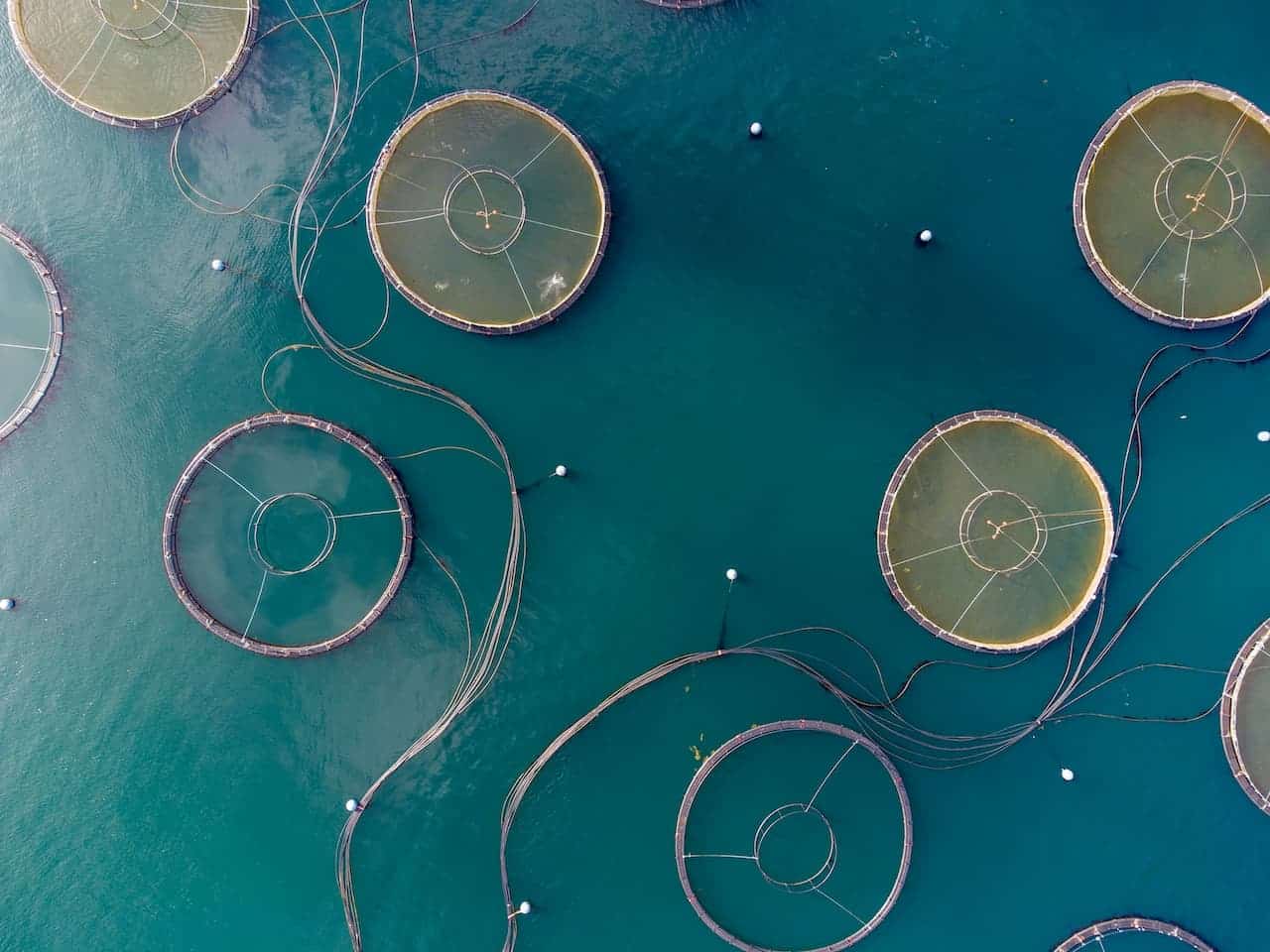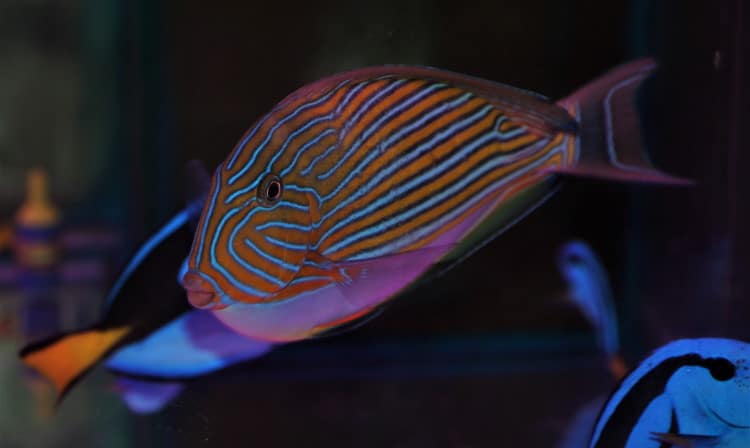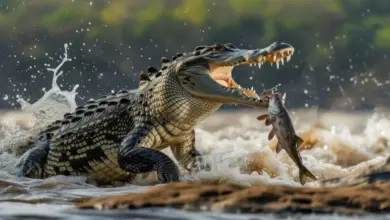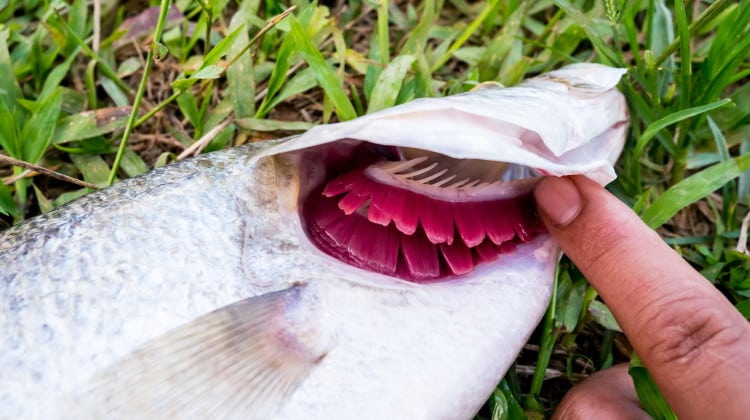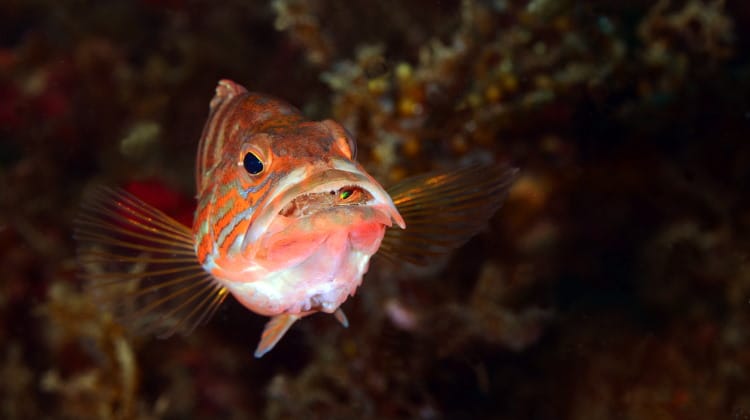Can a Fish Drown? Do They Need Oxygen?
There’s no denying that fish breathe differently compared to other animals, especially ground-dwelling creatures. But can a fish drown?
Fish can suffocate underwater, but they cannot drown. Lack of oxygen, water contamination, as well as their gills being unable to do their job, are the causes of a fish dying in water rather than drowning per se.

Fish Need Oxygen
Even though they don’t live on the ground like mammals, birds, and other species of animals do, fish still need oxygen to be alive.
However, unlike other animals, most fish species are not equipped with lungs.
That means that they only rely on their gills to filter out the oxygen from the water, which ends up in their bloodstream and gets to all of their tissues and organs.
Oxygen is vital to all fish. Any other animal that survives in the water without needing to breathe oxygen cannot be considered a fish and is usually taxonomically categorized as something else.
Some parasites, for example, do not need oxygen to be alive. If a parasite like Henneguya salminicola finds a host like a salmon fish, it can thrive without ever needing to breathe.
The same goes for tardigrades, micro-animals that are also known as water bears. Compared to these creatures, fish do need oxygen.

Fish Don’t Drown. They Suffocate for Lack of Oxygen
Although they do not actually drown in the sense that people and other animals can because most fish do not have lungs, they can indeed die because of a lack of oxygen or as a result of their gills not functioning properly.
We mentioned a parasite at the beginning of our article, and we’d like to note that some actually have a preference for the gill area of a fish’s body.
Flukes such as Gyrodactilus (or Dactylogyrus) species, along with crustaceans such as Lernaea, can affect the gill tissue to such an extent that it loses its capability to absorb oxygen from the water.
But parasites aren’t the only organisms that can cause damage to a fish’s gills. So can fungi, for example, which can sometimes affect both wild and pet fish, with the most common culprit for both being Saprolegnia species.
Then, there are gill mites.
Although different from the first types of parasites that we mentioned, mites are also capable of attaching to the gill tissue and feeding on the fish’s blood, which leads to the gill epithelium not functioning correctly.
So, even if they don’t have lungs that fill with water and they don’t drown for this reason, fish can still drown in water – just not because of the same reasons a mammal would, for example.
Oxygen deprivation, water contamination, or CO2 poisoning can be other causes of a fish drowning in water.

How Do the Gills of a Fish Work?
The anatomy of the gill itself is quite complicated, and while we are not going to go into any heavy explanation, we will note that it effectively contains a ‘mesh’ of cells known as the epithelium.
These cells capture the oxygen from the water that flows into the gills and then transport it into a number of arteries that the tissue is peppered with.
The oxygen is then delivered to the rest of the circulatory system and, from there, to the organs and tissues that the fish has in its body.
If you’ve ever seen a fish in water, whether a freshwater or a saltwater one, you probably know that it opens and closes its mouth almost continuously.
But although it might look like breathing to us, the fish does this in order to direct water into its gills which then release it after the oxygen is captured by the formerly mentioned epithelium.
If one or both of the gills become blocked or lose their functionality, the fish can suffocate, although it might look like drowning to us.
If you have pet fish, you may have the experience of one or two suffocating and falling to the bottom of the tank – especially if they were diagnosed with gill fungi, parasites, bacterial disease, or mites.
But not all fish do this when they die. Some float as a result of body decay as their bodies fill up with gas as a part of this process.

The Difference Between Drowning and Suffocating
The difference between these two terms pertains to terminology more than it does to the actual process, at least in the case of fish.
As we have previously noted, a fish can only die if its gills aren’t capable of doing their job or if there is not enough oxygen in the water.
Fish suffocate when taken out of water because they are not equipped with the respiratory system that enables them to breathe air.
So, in their case, drowning is a synonym for suffocation (considering the loss of any respiratory ability).
How Do Fish Suffocate Underwater?
If the gills are damaged in any way or if there are significant changes to the water itself, the fish can suffocate and lose their life.
However, they do not inhale water and die because of this reason; but they do die because of a lack of oxygen.

Reasons for Low Oxygen Levels in Water
Water quality matters a lot for both fish and other marine animals, and one of the ways of telling when it is sub-par is to measure the dissolved oxygen level. Marine biologists and scientists often perform such tests to see whether the environment is conducive to maintaining life or if they should interfere in any way.
While it might be impossible to increase the oxygen level in a body of water as huge as the ocean, the same can’t be said for lakes, ponds, or other bodies of water commonly used for fish farming.
Low oxygen levels can be caused by the following:
- Weather changes
- An increase in water temperature
- Excessive algae growth
- Contamination with wastewater treatments or municipal water discharges
- Excessive phytoplankton
- Overcrowding
- Chemical treatments
- Poor or no water movement (and therefore, no aeration)
An interesting fact about water oxygen levels is that any body of water is capable of retaining more oxygen during the winter or the cold season, in general, than it does in the summer.
This happens because the process of evaporation is less severe in these situations.

How Much Oxygen Should Water Contain in Order for Fish Not to Suffocate and Die?
The answer to this question is that it actually depends on each species. Clams and worms (invertebrates) need much less oxygen compared to other animals that live in water, sometimes less than 1mg/L.
By contrast, crabs and anchovies need around 3mg/L, while hard clams and white or yellow perches need as much as 5mg/L. For reference, tap water normally contains between 6.5 and 8mg/L of dissolved oxygen.
The amount of salt present in the water also influences the way oxygen dissolves in it, and hydrostatic and air pressure have a say, too. Freshwater fish have slightly different oxygen requirements.
For example, carp needs a level of at least 4mg/L in order to remain healthy.
At 3mg/L, the fish will reduce feeding, and at levels under 2mg/L to 1.5mg/L they will actually gasp and come up to the surface of the water in search of oxygen.

Do Fish Have Lungs and What Are Labyrinth Organs?
Not all fish are the same.
While the vast majority of species that can be encountered only rely on their gills to breathe underwater, some are different.
Yes, there are some fish species that are equipped with lungs, but they are very rare.
Adequately named lungfish, they can now be found only in select areas of Australia, South America, and Africa.
To some extent, lungfish are considered a link between fish and tetrapods. Most lungfish love murky waters and somewhat resemble eels in terms of their anatomy.
The other category of fish that doesn’t use gills is the one that has labyrinth organs. But what exactly are labyrinth organs?
Well, they can be looked at as modified lungs as they allow the fish to survive underwater for a period of time, but once every now and then, they will still need to come up for a gulp of air.
Bettas are part of this category, along with Gouramis and Paradise Fish – which a pet fish aficionado might already be acquainted with.
So, while not all fish have lungs, some actually do and others have labyrinth organs, a type of modified lungs.
Frequently Asked Questions
Can a Fish Drown if Pulled Backward?
When you pull a fish backward, especially one such as a small shark, you’re effectively destroying the gill tissue, which means that afterward, the animal can indeed die.
Can Fish Drown if They Go Too Deep?
But fish are equipped with instincts just like any other animal, so they will start swimming more to the surface of the water when they start to feel uncomfortable because of a decrease in the amount of oxygen.
That is why whenever the oxygen level in any body of water drops, you will see fish trying to gasp for air even though their gills aren’t even really able to process air properly.
Final Thoughts
So, can a fish drown? Yes and no at the same time.
Fish can’t drown because drowning is a term that defines the action of lungs being filled with water and an animal being incapable of breathing as a result of that.
However, fish can suffocate for a wide range of reasons, whether that be low oxygen levels or damage to their gills.
Fish can also suffocate when taken out of water because they don’t have organs that can process the air like other animals.
References
Parasitic Diseases of Fish, Barbara D. Petty et al, MSD Manual, 2022: https://www.msdvetmanual.com/exotic-and-laboratory-animals/aquarium-fish/parasitic-diseases-of-fish
Dissolved Oxygen, Chesapeake Bay Program; Science. Restoration. Partnership: https://www.chesapeakebay.net/discover/dissolved_oxygen
FAO: Aeration and Oxygenation in Aquaculture, J. Kepenyes and L. Varadi, Fish Culture Research Institute, Szarvas, Hungary: https://www.fao.org/3/X5744E/x5744e0m.htm
Development of gas exchange and ion regulation in two species of air-breathing fish, Betta splendens and Macropodus opercularis, Chun-Yen Huang et al, 2015: https://pubmed.ncbi.nlm.nih.gov/25783787/ Low Dissolved Oxygen in Water: Causes, Impact on Aquatic Life – An Overview, Minnesota Pollution Control Agency, 2009: https://www.pca.state.mn.us/sites/default/files/wq-iw3-24.pdf

